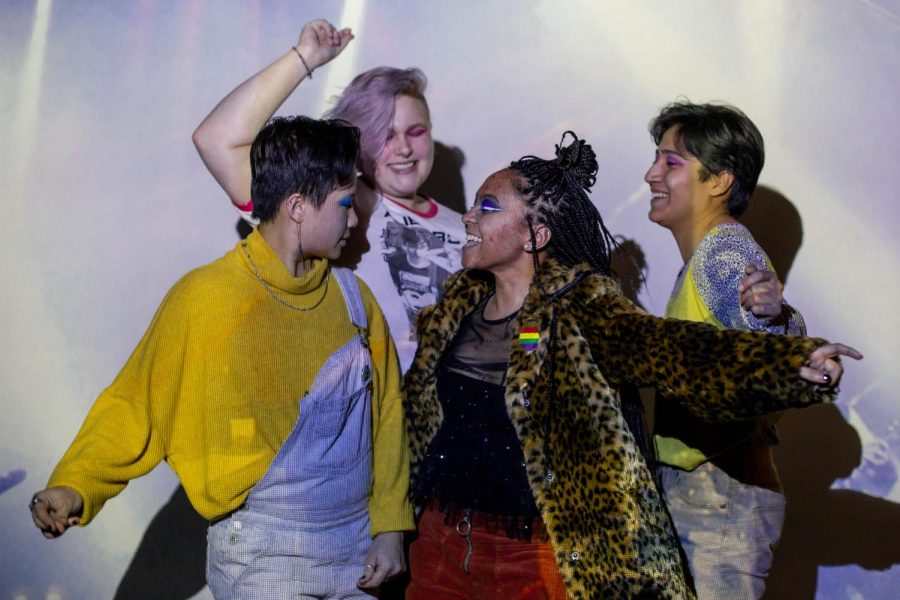Here & Queer
February 18, 2019
The city of Corvallis is home to different fashion styles and genres of music, from EDM nights to punk house shows, there’s something for everyone in this college town. Corvallis DIY, Bitterhalf Booking, Rainbow in the Clouds and Haus of Dharma, are just a few community organizations that make the Corvallis art scene a safe place for marginalized folxs.
Corvallis DIY is a music collective with a focus on punk, hardcore, emo, and other sub genres of music in Corvallis, Ore. Their ideology centers around making local house shows and concerts more inclusive for POC (people of color), QTPOC (queer trans people of color), and female-identified folxs.
Donald Orr, a past KBVR FM station manager and active member of the Corvallis DIY community, reflects on the impact of inclusive spaces; as they “allow for a truly inclusive community, and leave the scene open for people of color, LGBTQIA+ folx, and members of traditionally marginalized groups to feel welcomed. Many of the shows in the DIY scene, feature musicians/band members that are part of marginalized groups as well. Safer spaces allow for people to feel safe and welcomed, whereas they may not feel that way in other concert venues. The community focuses on uplifting diverse voices and music within the realm of punk.”
Indiana Laub of Bitter Half Booking, an organization that sprung out of Corvallis DIY focuses on booking feminist bands, political bands, bands made up of women, queer individuals, and people of color. As a show organizer Laub works to create a space where through music, people can become more aware of politics and social issues while simultaneously becoming empowered to work toward radical change. A key component in the DIY house show scene is to have an all ages venue space.
“All ages allows shows to not just be focused on settings with alcohol, but on the music—it lets kids be a part of the scene earlier, Corvallis High School kids and new OSU students alike,” Orr said. When asked about inclusivity, Orr describes how it’s important to uplift diverse voices.
“Within the Corvallis scene, we try our best to be as inclusive as we can. I don’t book the shows myself but I host shows in my basement, known as Mudville Stadium. The organizers of Bitter Half Booking try to be as transparent as possible—booking femme-fronted bands, POC bands, QTPOC bands, etc. and we list how accessible the space is,” said Orr.
Alien Boy a group that describes themselves as a “loud gay band” from Portland, Ore. kicked off their 2018 North American “Dreams and Queer Feeling” tour on a warm September night at Mudville Stadium. That night, a diverse group of folxs filled Orr’s basement, cramming together and bobbing their heads in unison to Alien Boy’s emo punk sound.
Sonia Weber, lead singer and guitar player, discusses the difficulties of being a queer band and not feeling like you fit in.
“We’ve found a lot of love in primarily straight/emo scenes which is funny to me—and sometimes we’re a little too pop punk for the queer scene at least in Portland… I wouldn’t have it any other way though, there’s so many more important things you could be doing with your life than being in a rock band, so if I’m going to do it, I’m at least gonna do it for the queers, ya know,” Weber said.
After the success of prominent punk bands like the the Ramones and the Sex Pistols, “political punk” and “Riot Grrrl” music established itself as the anthem for anti-sexism, and anti-fascism. During the 1980’s there was a Nazi punk scene, which mistreated people of color, womxn, and queer folxs, giving punk music a bad reputation.
To combat the negative connotations of punk, newer bands like Alien Boy are making it known that, “if you come to an alien boy show, that sh*t won’t fly and…when I’m not feeling nervous I try to remind people to let womxn, queers, and poc to the front [of the concert].” This viewpoint is shared by Orr who hosted Alien Boy.
“While there’s a focus on inclusivity, we also aren’t afraid to call out bigotry and jerkhood in the community. The fine line of maintaining a safer space while also being inclusive is being able to monitor when people aren’t portraying attitudes or actions of being inclusive themselves,” Orr said.
Speaking out against hate in artistic spaces goes beyond music, it includes fashion too. Sonia from Alien Boy says, and believes that fashion has a large role in creating social change.
“There ain’t no revolution unless you’re lookin good!” Weber said, “Bands create other universes where we get to build and choose the way we run things, we choose our anthems, we choose our uniforms or there lack of…it’s the perfect platform for collaboration and real social change.”
Two other community organizations that are actively creating inclusivity in Corvallis are Rainbow in the Clouds and Haus of Dharma. House of Dharma is a local drag family and artist collective that organizes PRIDE Corvallis and Rainbow in the Clouds that hosts a monthly LGBTQ+ dance party.
Dharma Mirza is a student at OSU and the mother and director of Haus of Dharma. Mirza explains that events allow individuals to establish community and defy the “marginalization that most folks who are queer, trans, or gender nonconforming” face.
“Many venue performance art spaces are not always as friendly towards folks in our community and so we are creating an inclusive art scene here by providing safer spaces that critically engage. The events that we do in the spaces that we create help to normalize queer and trans nightlife here in Corvallis and are helping to catalyze support for folks in our community here,” Mirza said, “We not only have fun by engaging with these nightlife spaces but we’re also changing the culture of Corvallis by celebrating our community. Drag specifically challenges societal expectations surrounding gender expression, aesthetics and what it means to radically to find oneself which is privy to creating inclusive art space here in town.”
In Corvallis, music and fashion are two ways of bringing communities closer and methods of embracing your authentic self. The intersectionality in the artistic community practices inclusivity and promotes self-expression in our society. Without fashion and music, safe spaces in Corvallis for marginalized folxs might not exist.
At the end of the day, what you wear and what you listen both have the potential to evoke feelings and create social change.


